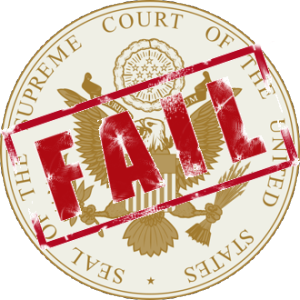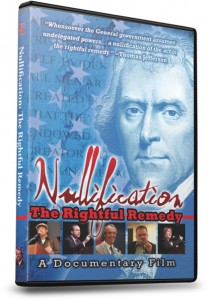 The Cato Institute has now joined the Heritage Foundation in telling Americans they’re not allowed to nullify unconstitutional laws — because, after all, that’s what we have the Supreme Court for. Plus, says Cato chairman Robert Levy, nullification hasn’t worked so well in the past, though he doesn’t give us an update on how 100 years of relying on the Supreme Court to safeguard our liberties has been going.
The Cato Institute has now joined the Heritage Foundation in telling Americans they’re not allowed to nullify unconstitutional laws — because, after all, that’s what we have the Supreme Court for. Plus, says Cato chairman Robert Levy, nullification hasn’t worked so well in the past, though he doesn’t give us an update on how 100 years of relying on the Supreme Court to safeguard our liberties has been going.
Levy does allow the states something, because the Supreme Court has graciously allowed them these things:
First, are states required to enforce federal laws and enact regulatory programs that Congress mandates? The answer on both counts is “No.”
In the 1997 case, Printz v. United States, the Supreme Court ruled that the federal government could not command state law enforcement authorities to conduct background checks on prospective handgun purchasers.
In the 1992 case, New York v. United States, the Court ruled that Congress couldn’t require states to enact specified waste disposal regulations.
Levy’s article is fairly conventional law school fare, a string of statements that such-and-such must be true because federal courts have said so. It is what I would expect to read from the Heritage Foundation, from John Marshall admirers, and from nationalists. There is nothing particularly libertarian about Levy’s analysis. The message is this: play by the rules. The rules have been laid down by people who despise you, but play by them.
If I am correct that the peoples of the states are the sovereigns in the American system, and I believe I have shown this to the satisfaction of a reasonable person, then the idea that there can be no state-level resistance to the federal government — even to the divinities on the Supreme Court — becomes obviously absurd. If the peoples of the states created the federal government and its subdivisions as their agent, how do they permanently lose the ability to stop their own creation from destroying them? Since when does the agent tell the principals what its powers are?
To say that the Supreme Court must decide constitutionality in the last resort is to beg all the relevant questions. To say that the Supreme Court has itself decided that it must be this arbiter is to take question-begging to quite an extreme. How can the Supreme Court, part of an agent of the states, have the absolutely final say, even above the sovereign entities that created it? As Madison explained in 1800, the courts have their role, but the parties to the Constitution naturally have to have some kind of defense mechanism in the last resort.
On these points, see my post “Is Nullification Unconstitutional?”
Levy then tries to claim that Jefferson and Madison couldn’t have meant what they clearly did mean, and what everyone at the time took them to mean. James Barbour noted in the Virginia General Assembly (which is where one must go for the intent of the Virginia Resolutions, in the same way that we look to the ratifying conventions for the original intent of the Constitution) that an unconstitutional law was null, void, and of no force or effect, and the General Assembly noted that where the federal government had adopted an unconstitutional and dangerous policy, the states were duty bound to prevent the enforcement of that law within their respective territories. To claim further that this meant that the states could carry out this duty only if all of them agreed is not permissible on the basis of what we read in the General Assembly debate.
As for Madison’s later claims that he had never meant to endorse nullification, etc., this is addressed in my Nullification FAQ and on pages 288-290 of my book Nullification. (Poor Madison even tried to pretend Jefferson had never endorsed nullification, until the draft resolutions of 1798 in Jefferson’s handwriting were shown to him and he was forced to withdraw his claim.)
Objections to nullification are addressed in some detail at NullificationFAQ.com, and that is once again where I direct readers.
I might also add that a faulty understanding of constitutional history is often at the root of the objections to nullification. There are conservatives — and amazingly, even some libertarians –who portray Chief Justice John Marshall as a hero. He is a hero if you like the federal government we have now. Otherwise, not so much.
This is precisely why I wanted (and recently added) a downloadable U.S. Constitutional History course at LibertyClassroom.com: to teach people the Constitution without all the Marshall/Hamilton/Webster accretions — in other words, to teach it in a way you will not learn it in any law school, which is committed to those accretions.
(And thanks to Kevin Gutzman, one of the professors in our constitutional history course, for discussing these matters with me.)
- The Great Gold Robbery of 1933 - April 5, 2020
- The Two Paragraphs the So-Called Legal Experts are Keeping from You - November 19, 2018
- The Constitution and War Powers: Not a Presidential Dictatorship - April 9, 2018

